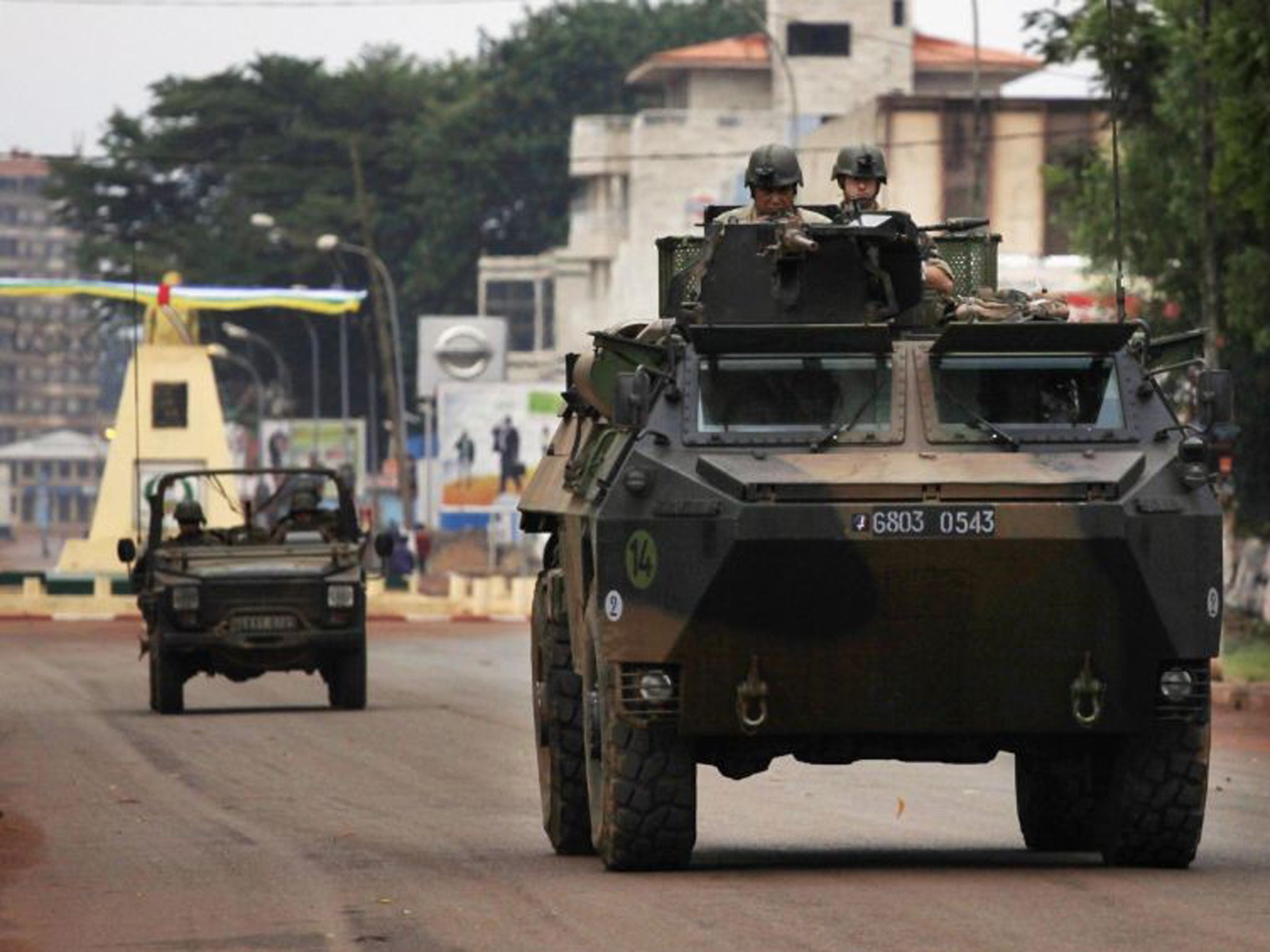French troops rumbled into Central African Republic on Friday, trying to quell violence in the capital a day after armed Christian fighters raided Muslim neighborhoods, leaving nearly 100 people dead.
France began sending reinforcements within hours of a UN vote Thursday authorizing its troops to try to stabilize the country. But French officials insisted the mission's aims are limited — to bring a minimum of security to Bangui, where people now fear to leave their homes, and to support an African-led force.
"You have to secure, you have to disarm," French Defense Minister Jean-Yves Le Drian told Radio France Internationale. "You have to ensure that the vandals, the bandits, the militias know they can't use the streets of Bangui for their battles."
The streets of Bangui were deserted this morning, with the only vehicles on the road belonging to either international security forces or the rebel fighters who claim control of the government.
There was no repeat of the clashes that left nearly 100 people dead in Bangui on Thursday, Le Drian said.
But since thousands of armed Muslim rebels invaded Bangui in March, the city remains awash in weapons. Recent attempts at disarmament have yielded little in a near-anarchic state.
Since 2011, France has intervened in four African countries, in Ivory Coast, on a joint mission in Libya, in Mali and now in Central African Republic.
In January, France sent in 5,000 troops to Mali to quash al-Qa'ida and other radicals in the north who were seen as a terrorist threat to countries around the region. That dwarfs the mission in Central African Republic, where 1,200 French troops are to help an African force secure the nearly-lawless country as Muslim rebels run rampant after toppling the president in March.
And it's not clear how France can achieve even its limited goals in the space of six months.
"There's a big gap between the vision France has of itself as a global power and as a power that can intervene," said Aline Leboeuf, a security and development specialist at the French Institute for International Relations.
The real question, she added, is: "Can you intervene in the right way and when do you leave?"
Scores died in Thursday's attack, including 48 people whose bodies were laid out at a mosque in a northern suburb of Bangui. The charity group Doctors Without Borders said another 50 deaths had been confirmed at its hospitals, bringing the toll to 98.
Some of those killed on Thursday died of bullet wounds, others from what appeared to be blows from machetes known as "balakas."
The Christian militia has adopted the moniker "anti-balaka," in reference to prior attacks on Christians that used machetes. But now they seem to have adopted the weapon themselves.
Rebel leader-turned-president Michel Djotodia appealed for calm, even as his residence and that of the prime minister were looted and vandalized by the fighters. He announced a dusk-to-dawn curfew in a bid to stem the threat of retaliatory violence against Christians from Muslims.
"This morning, the enemies of Central African Republic wanted to destabilize the country but they have failed," Djotodia announced Thursday in a speech broadcast in the Sango language on state radio.
France already has hundreds of soldiers in Bangui, and an armored personnel carrier and other military vehicles patrolled the streets.
Le Drian said a helicopter detachment was arriving Friday, along with more troops.
Djotodia, the country's current ruler, who is Muslim, managed to unify several rebel groups in the country's mostly Muslim north, where resentment of the federal government and a sense of disenfranchisement has been rife for years. Once those rebels — known as Seleka, the local word for coalition — were unleashed upon the capital, he wielded very little control over the mix of bush fighters, child soldiers and foreign mercenaries he had recruited along the way.
Before long, human rights groups were documenting cases of Seleka rebels going door to door with machetes, bludgeoning their victims and burning down scores of homes.
Supporters of the ousted president began rising up in opposition to the lawless and ruthless rebels, forming self-defense militias such as the ones behind Thursday's attack.
AP
Subscribe to Independent Premium to bookmark this article
Want to bookmark your favourite articles and stories to read or reference later? Start your Independent Premium subscription today.


Join our commenting forum
Join thought-provoking conversations, follow other Independent readers and see their replies